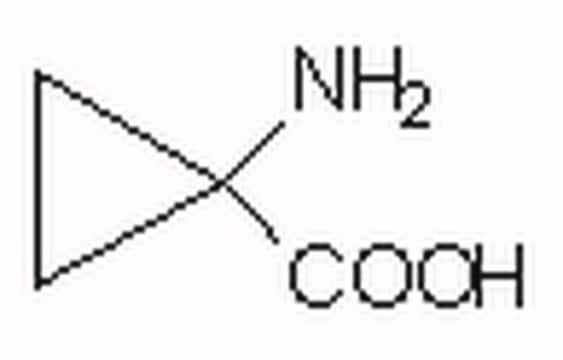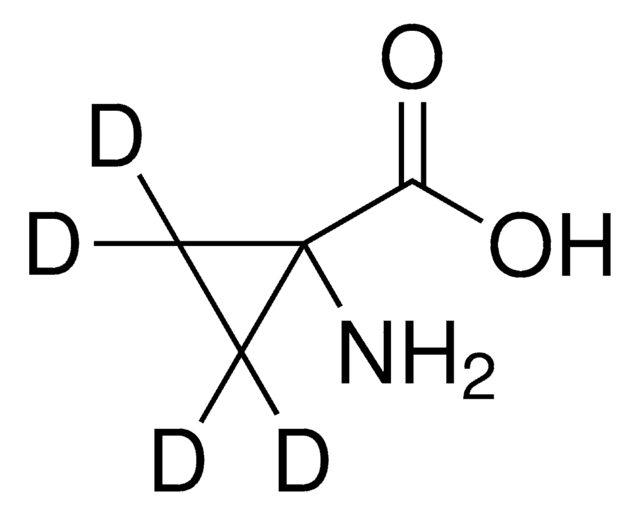A3903
1-Aminocyclopropanecarboxylic acid
≥98% (TLC), powder, NMDA agonist
Synonyme(s) :
ACC, ACPC
About This Item
Produits recommandés
product name
1-Aminocyclopropanecarboxylic acid, ≥98% (TLC), powder
Niveau de qualité
Pureté
≥98% (TLC)
Forme
powder
Conditions de stockage
(Keep container tightly closed in a dry and well-ventilated place.
Keep in a dry place.)
Couleur
white
Pf
229-231 °C (lit.)
Solubilité
water: 49.00-51.00 mg/mL, clear, colorless
Chaîne SMILES
NC1(CC1)C(O)=O
InChI
1S/C4H7NO2/c5-4(1-2-4)3(6)7/h1-2,5H2,(H,6,7)
Clé InChI
PAJPWUMXBYXFCZ-UHFFFAOYSA-N
Informations sur le gène
human ... NARG2(79664)
mouse ... NARG2(93697)
rat ... LOC686240(686240) , NARG2(691379)
Vous recherchez des produits similaires ? Visite Guide de comparaison des produits
Description générale
1-Aminocyclopropanecarboxylic acid (ACC) is a non-proteinogenic amino acid and is a member of 1-aminocycloalkanecarboxylic acids.
Application
Actions biochimiques/physiologiques
Anticorps
Produit(s) apparenté(s)
Code de la classe de stockage
11 - Combustible Solids
Classe de danger pour l'eau (WGK)
WGK 3
Point d'éclair (°F)
Not applicable
Point d'éclair (°C)
Not applicable
Équipement de protection individuelle
dust mask type N95 (US), Eyeshields, Gloves
Certificats d'analyse (COA)
Recherchez un Certificats d'analyse (COA) en saisissant le numéro de lot du produit. Les numéros de lot figurent sur l'étiquette du produit après les mots "Lot" ou "Batch".
Déjà en possession de ce produit ?
Retrouvez la documentation relative aux produits que vous avez récemment achetés dans la Bibliothèque de documents.
Les clients ont également consulté
Notre équipe de scientifiques dispose d'une expérience dans tous les secteurs de la recherche, notamment en sciences de la vie, science des matériaux, synthèse chimique, chromatographie, analyse et dans de nombreux autres domaines..
Contacter notre Service technique









